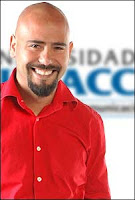
I have now officially been up for 12 hours (it’s 4.45pm!) and could do with a snooze, but I can’t because a) I might sleep past by stop, b)my contact lenses will stick to my eyes and c) my mind is buzzing!
I’ve spent the day at Fernhill School and Language College in Farnborough, Hampshire at the invitation of Steph Hopkins. Having met at Joe Dale’s Isle of Wight Conference 2007 where I did a couple of sessions on Primary Language Learning and eTwinning, Steph had asked me to speak at her conference entitled Creating a compelling curriculum. Although it’s a long way from Sutton Coldfield to Farnborough, I readily accepted as it’s flattering to be asked and I do like a day out :o)
My session was entitled Keeping it compelling (more of that later!)
The day consisted of sessions led by Steph in the morning about the new Secondary Curriculum, the SLNs and then a session on phonics rhythm and song, followed by workshops in the afternoon
CLIL led by Louise Wornell from Ringwood
Podcasting with Steph
Blogging and wikis with Alex Blagona from Northgate High School and
Keeping it compelling with me.
Once more, I would’ve liked to attend all the other sessions, and am hopeful that I’ll be able to catch some of them – sure Joe Dale had all his iRivers in action ;o)
Steph’s sessions were really interesting for me. As an ex-Secondary MFL teacher it was good to see how the curriculum has changed in the few years since I taught it, moving towards a more creative approach and less proscriptive content. Almost made me miss it – I did say nearly! I’m sure it would be very different. We considered how MFL can contribute to the whole curriculum dimensions of the Big Picture such as Enterprise, Creativity, Community and Healthy lifestyles. My group were considering Technology – nice one! Managed to mention EdTechRoundup, various blogs (including those of Joe, José 2 and MarieFrance) and things other people are doing with Google, Twitter, Facebook ..as well as my own blog. In fact I could’ve gone on for ever but reined back so the rest of the group could have a say!
It was also good to see how things have changed from the point of view of informing what happens at KS2. It makes sense to me that KS2 practitioners need to have an understanding of what is happening at KS3 just as KS3 need to be aware of the KS2 Framework for their work to make sense. It’s all about being ‘joined up’ or ‘pulling together the threads’ of language learning.
There were some very interesting snapshots offered from various members of the SLNs represented at the event. They have chosen to focus on boys’ attainment and use of TL, and I really enjoyed hearing about the creative ways in which schools were addressing these aspects. One group of lads at Fernhill have been split into two teams competing in a Bundesliga to win points for their team – Bayern Munchen or Werder Bremen – with points awarded for use of TL and against for poor teamwork such as calling out. Another school were using the pupils’ interests as the focus for work on healthy lifestyles, having a lesson lead by a group of pupils on an aspect of the topic such as sport, diet etc. And Wavell School are rewarding pupils bringing in items from their travels etc related to MFL with house points, valuing pupils showing initiative and interest in the wider aspects of language learning. I particularly like the way that they had asked pupils what they’d like to do in terms of content and activity in MFL and then acted on it with a carrot and stick approach – give them what they want, and remind them they asked for it when they complain they think it’s boring. Genius!
Steph’s session on Phonics, Rhythm and Song deserves a post of its own – so it shall get one!











